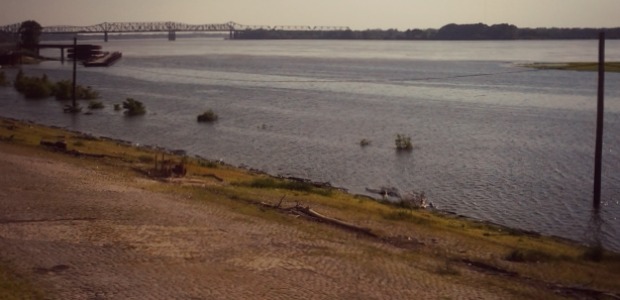You have no items in your cart. Want to get some nice things?
Go shopping
I’m not saying he’ll let you in. He may shut the door in your face. If you’re really unlucky you might find yourself on the business end of a shotgun, staring into the wild blue eyes of an Englishman who hasn’t slept in three days. As he will tell me at dinner, the Delta does strange things to people. But if you do attempt to visit the Mississippi home of journalist Richard Grant, and it’s July, and you’ve driven four hours south from Memphis in the summer heat into one of the most evocative, desolate, and immersing landscapes in America, you may encounter some surprises.
And I am surprised. Because after all the two-lane roads and dollar stores, after the wide fields of short, green cotton plants, the men standing around trucks with nothing to do, and the leafy Kudzu monsters lurching through roadside forests, I drive ten miles down an unmarked plantation road in a town called Pluto, catch my first glimpse of the Yazoo River and my mind goes quiet. A far bird casts itself across the sky. I turn off the radio.
The trees are taller and fuller here, the brown water runs swiftly between its narrow banks. Immense cotton fields are walled by oaks that huddle in distant groves. Driving slowly, I pass houses with only a vague sense of what I am looking for. A panting dog watches me from the roadside. In an area where many people put a good mile between themselves and their nearest neighbour, and where everyone is in Grant’s words “armed to the teeth,” I am not anxious to show up unannounced on the wrong front porch.
I pull into the dirt beside the road and call him. I hope to ask for directions but as soon as he answers I see a tiny face and a high white hand waving to me from behind bushes a football field away. When I reach him he greets me with a firm handshake as two big mutts wobble happily around us. He is tall, lean, his hair is damp with sweat and his blue eyes shine over a dark, grey-pocked beard. He looks a bit bemused that I would come this far to talk to him.
Richard Grant has moved to the Mississippi Delta to write a book. An inveterate traveller, his last two books, Bandit Roads and Crazy River, are filled with near fatal scrapes with dangerous people in hotspots like Northern Mexico or Central Africa. When I heard he was now living here, in one of the most poverty stricken regions in America, I thought I knew what he was up to. There he was, I thought, down in the Delta, turning his unflinching journalistic eye on his adopted homeland by getting right to the bottom of what is wrong with us. I imagined I knew what he was writing before he even wrote it. That was before I got here.
He shows me around. We enter the five-bedroom plantation house he shares with his fiancé, an Arizonan named Mariah. The home has high ceilings and large windows with panes that have warped becomingly over time. I am surprised when he tells me he bought the place.
“I never meant to buy a house,” he explains, leading me through rooms bathed in calm, Friday afternoon light. “But once I came inside I knew I wanted to live here. Buying was the only way to make that happen. There’s just something about this house.”
He’s right. The space has charisma. I ask him if he will keep it after his book is finished.
“I really hope so,” he says.
The home is filled with antique furniture that looks to have stood undisturbed for decades but was actually just lugged over in a frenzy of hospitality by their new neighbours.
“The people around here have been fantastic,” he says with residual awe. “They’ve really taken us under their wing.”
He takes me on a stroll around the property. The air is thick with the aromas of plants and flowers. Grant tells me the home’s previous owner was a physician with a knack for horticulture. He points out a bunch of pear trees, a fig tree the size of a dump truck. He was unprepared, he says, for the demands of estate maintenance. He does yard work almost every day and there is always more to do: a colonizing bamboo thicket must be beaten back by machete and shears; the fruit trees need pruning; cottonmouth snakes will be discovered and removed, or killed; and—of course—the endless mowing. Explaining this to me, his long arm gesturing to this hill or that field, a slight shadow of worry darkens his face. He says he’s been shooting armadillos that root in his garden.
We visit the shed where he does his writing. It’s hot inside, Spartan, but clean, with ample sunlight through the windows. Neat stacks of papers and books frame the surface of his rustic desk, and a dry-erase board preserves his arcane organizational chartings: words and numbers in boxes, some kind of an outline. It’s got to be 100 degrees in here. I realize his hair was sweaty because he had been working.
Enthused by the prospect of reading his take on the Delta, I ask how the project is going.
“Slowly,” he says. “The more I learn about this place, the less I know.”
I see few outward signs of the seat-of-your-pants, slash-and-burn narrator of Bandit Roads, with whom I vicariously fled coked-up narcos in the wilds of the Sierra Madre. Grant talks a lot about his new neighbours, how nice they are. How he expected rural isolation but finds himself a member of one of the warmest and most sociable communities he’s ever been a part of. When I ask what made him want to write about Mississippi, he looks around his enviable homestead as though trying to get his bearings in the midst of a feeling that is unfamiliar to him. “I just like it here.” He seems surprised by the simplicity of his answer.
Closer to evening, Mariah arrives, exuding the kind of warmth and intelligence that puts a stranger at ease. We all sit down to a big pasta dinner. Grant talks about his research, about the people he’s met. He tells me wild crimes committed by colourful personalities. He recounts small kindnesses and encounters with the last Blues men. They have had moments of culture shock. Word has spread about the “Anglishman” living in the area and Grant’s London accent has been a source of amusement.
“Go on, say ‘banana’,” he mimics in his best Mississippi drawl. “But like you say it.”
He and Mariah have a sense of wonder about this, about the improbability of finding themselves here, working and owning property. Talking, they look to each other for corroboration. It is almost possible to intuit the depths of their adventure as I share their table. But what I suspect passes more subtly between them, and what twists that furrow of worry into Grant’s brow, is the extent to which they are finding themselves at home. It may have started as a lark, fodder for a book, a short foray into a slower, more provincial existence, but something else is surfacing and it’s derailing the adventurer’s agenda. This is surprising to me as a visitor mired in preconceptions, but it doesn’t seem any less surprising to Grant. He is again exploring a terrain that is exotic to him, but this time the terrain is of a radically unfamiliar character. Its name is as unexpected to me as the beauty of this Delta dusk falling like lace over the dining room table: contentment.
Behind his empty plate and drained wine glass, Grant leans back in his chair and admits he does not know what he will say about this place. The tide of time recedes; the natural world outside encroaches, running vines into the yard, goading snakes onto his spacious front porch. Insects are singing. The room is nearly dark.
Grant stands up and pours me another glass of red wine.
“Did I tell you we’re getting married this fall?”
“Congratulations,” I say. “Where?”
“Right here,” he responds, falling back into his seat and looking warmly at Mariah. “In the yard. With the neighbours. A real Mississippi wedding.”
“And will you have finished the book by then?”
He shoots me a look that says I’m peering too keenly into the practitioner’s sanctuary. Then he looks to the floor where one of his dogs is curled up, sleeping soundly.
“I have a lot of insomnia, so I get jealous of her when she sleeps like that.”
The three of us watch the dog. Finally, he answers my question, sort of.
“Hard to tell where it’s all going,” he says.





Great piece. Holmes evokes both Grant and the landscape with energy and precision.